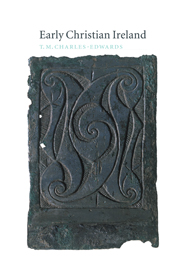Book contents
- Frontmatter
- Contents
- List of maps
- List of tables
- List of figures
- Acknowledgements
- Abbreviations
- A note on pronunciation
- A note on the Chronicle of Ireland
- Introduction
- 1 Ireland in the seventh century: a tour
- 2 Irish society c. 700: I. Communities
- 3 Irish society c. 700: II Social distinctions and moral values
- 4 Ireland and Rome
- 5 Conversion to Christianity
- 6 The organisation of the early Irish Church
- 7 Columba, Iona and Lindisfarne
- 8 Columbanus and his disciples
- 9 The Paschal controversy
- 10 The primatial claims of Armagh, Kildare and Canterbury
- 11 The origins and rise of the Uí Néill
- 12 The kingship of Tara
- 13 The powers of kings
- 14 Conclusion
- Appendix: genealogies and king-lists
- Glossary: Irish and Latin
- Bibliography
- Index
13 - The powers of kings
Published online by Cambridge University Press: 11 September 2009
- Frontmatter
- Contents
- List of maps
- List of tables
- List of figures
- Acknowledgements
- Abbreviations
- A note on pronunciation
- A note on the Chronicle of Ireland
- Introduction
- 1 Ireland in the seventh century: a tour
- 2 Irish society c. 700: I. Communities
- 3 Irish society c. 700: II Social distinctions and moral values
- 4 Ireland and Rome
- 5 Conversion to Christianity
- 6 The organisation of the early Irish Church
- 7 Columba, Iona and Lindisfarne
- 8 Columbanus and his disciples
- 9 The Paschal controversy
- 10 The primatial claims of Armagh, Kildare and Canterbury
- 11 The origins and rise of the Uí Néill
- 12 The kingship of Tara
- 13 The powers of kings
- 14 Conclusion
- Appendix: genealogies and king-lists
- Glossary: Irish and Latin
- Bibliography
- Index
Summary
In the eighth century it becomes possible to analyse in some detail how Irish kingship worked. Three texts show, for example, what privileges client-kings hoped to gain from their overlords. Moreover, origin-legends help to put them in their proper context – to understand not just the claims themselves but the stories that justified them and placed them within the total narrative of the island of Ireland. One of these three texts we have met already, the poem on the Airgíalla to which the story of ‘The Three Collas’ provided the supporting narrative. The other two both come from Munster. One, the West Munster Synod, is a half-royal, half-ecclesiastical narrative designed to justify a rebellion by a group of West Munster kingdoms, led by the Cíarraige Lúachra, against their immediate overlord, the king of West Munster, who was of the Éoganacht Locha Léin. The other text is the Frithfolad Muman, ‘The Counter-Obligations of Munster’. Here, too, claims are made on behalf of client kingdoms, but in this instance the overking in question is the king of Munster with his royal seat at Cashel. The counter-obligations in question are owed by the king of Munster to his client-kingdoms in return for the obligations they have to him. In this text, therefore, there is no intention, as there was in the West Munster Synod, to deny or at least sharply reduce the power of the overlord.
- Type
- Chapter
- Information
- Early Christian Ireland , pp. 522 - 585Publisher: Cambridge University PressPrint publication year: 2000



